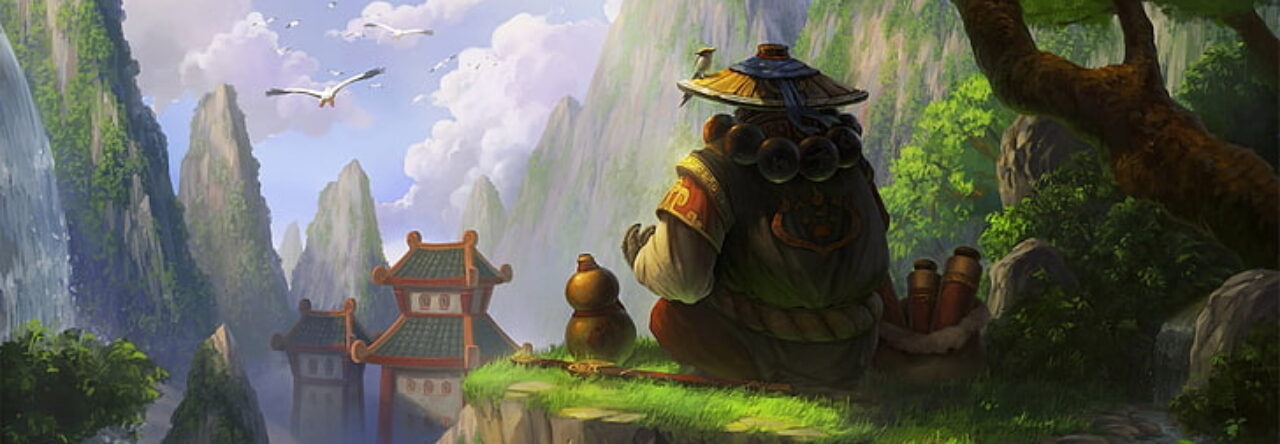I’ve had a couple people request I publish my final paper here, do note this is the final revision and revision is no longer on the table for me, here it is.
Author: Mark Sayre
What if you could play the Game D&D and still recieve college credit?
I introduce you to Anthology 1974-Worlds&Wonders: RP as Pedagogy.
one of my favorite content creators of the 2020s is Lisa Beasley, and specifically her character, Corporate Erin. Corporate Erin Embodies the ridiculous nature of the corporate language. Lisa Beasley has mastered the art of what I would call Dry comedy, what makes corporate erin such a great comedy character is that she doesn’t look like an act. If you’ve worked a corporate job, you’ve heard her voice before. She is funny because she is someone you’ve heard before, yet have no idea who she is.
Corporate Erin is the Managerial logistics manager for management at MCmanagment. Or if you don’t speak corporate, she manages the management system, and makes about 8500 every 2 weeks, but don’t worry after taxes she’s just like you, struggling. She highlights how over the top and ridiculous corporate managers can be. She also highlights the corporate dry gulp, the ridiculous accent or verbiage. I don’t know about you the reader but I for one don’t see why I should have to say the words Cohesion, Synergy or Equity in any setting not relating to a fictional story. I also couldn’t fathom the phrase core competencies being real. This is all to highlight the ridiculous nature of Corporate America, but these people don’t realize how ridiculous they sound. The vast Majority of Corporate Erin skits are on Lisa Beasley’s Tiktok, but some are on youtube, and one of the most fascinating corporate erin content I have seen was a video between her and Ginny Clarke. It is ultimately a skit but it does highlight the problematic nature of these individuals. Corporate Erin sends thousands of emails a day, and has many ‘pivotal’ one on ones day as well, but what happens when she get’s a 1-1 and is put on a PIP (performance improvement plan). Ginny masterfully highlights the difference between Leading vs Managing, and how she has good intentions but lacks empathy for others. Corporate Erin is a great reminder of what happens when people in leadership positions are put in those positions prematurely. They believe they are doing good, but who wants to be bombarded with emails, or have one one ones at 9pm, or even 5am. This is what makes Corporate Erin such a gem of a comedy character, she’s parodying someone out there right now, sitting in an office.
Wade in the water is a symbol of hope in the black community and a song that I believe outsiders in our culture have abused and twisted into a song that is a ‘traditional religious tune’. It is not, it never was and never has been and I’m tired of those who don’t understand it continuing to disrespect my ancestors and by extension, my culture. Instead of gatekeeping though, I openly accept those who are willing to hear it’s story, as it’s history is one that has been buried by time, and butchered by musicians.
Harriet Tubman was a slave that helped free other slaves back in the day, she was a smart women, especially for her time, and helped form the underground railroad, which was not a train nor a train system but instead was a group of free slaves who returned to danger and tried to help free others, and were willing to risk it all. If caught, slaves could be Executed, Tortured, Castrated or even raped, or a mixture of those four, though sometimes they would die as a result of the other 3, not that their masters cared. They understood the risk and did it anyways. A common misconception I hear about Wade in the water is that is it talking to a person named wade or was an attempt to say Wait, and neither is true. Wade is a verb that is to walk intentionally into water. But why? well back in the day the Plantation owners used to hire slave catchers who used dogs to track the scent of slaves, and the only way for them to evade the dogs was to get in the water. Harriet knew that and the only way for her to tell them without saying it and risking the slave owners finding out was to sing the song and get the other slaves to understand it’s hidden meaning: get in the river, off the trail, and out of sight.
So what about this invoked my rage, well I’m a musician, and a composer and when I discovered the history behind this song, and seeing what had been done to it by other composers, that made it into a spectacle and a choral piece, and overlooked it’s meaning, I felt a certain kind of way about it, here’s the example that I used, and whilst yes it is my arrangement, its not my original work, we will get to that in a second.
Listen here
It’s a stunning and great piece of choral work, but completely undermines the meaning of this song, this is an act of unintentional disrespect to our culture. Speaking of Culture,
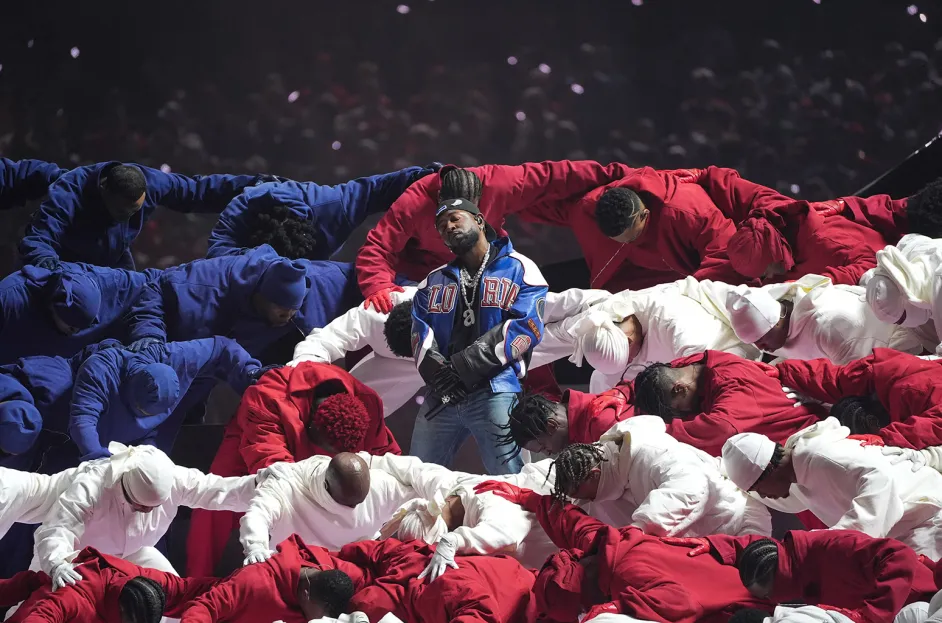
Yeah. Let’s not make this something it’s not, this is another part of the great american game, and while I finished the original version of my arrangement before this performance by Kendrick, I did think of him in terms of how everything is a message to those who listen. This song was a warning to the slaves, get off the trail, get in the water, survive. To those who hear it now, it’s a fun spiritual Tune devoid of meaning, that’s bullshit. I think that’s what set me off while i was arranging the ensemble version, it’s nice and fun but it is not wade in the water, it is a gross parody, same with all that are like it. This isn’t what Harriet risked her life to sing for, this isn’t what the underground railroad stood for, and this isn’t the song my people died to send a message with. Much like kendrick, I want people to miss the message when it is right in front of their face, and I want those who care to look at things differently from now on.
So I saw this and came up with a Thesis, and I will now present this next part as if I am defending my thesis, let me know what the committee (you) think (Pass, Pass with revision, Reject and here’s why). My thesis is as follows,
I want outsiders to leave this song alone, because if they understood, they would never want to sing this again.
So how was I going to reclaim this song from the mockery that the music community has turned it into? I wanted to start from a place I have never seen the Music community take this song, I wanted this to be a unique and leave the audience stunned. So how do I start, well of course I start how every other arrangement starts, the tune. but then I pivot, The next phrase begins with the Lead (Myself) name Dropping Harriet Tubman, and explaining how this song came from slaves, and how it told them to get in the water to avoid the dogs. Then we stop, and here is the moment I’ve been building Towards, I know that in a traditional Choral concert, the audience expects things to sound nice, and It does, but what they don’t expect is a history lesson, and especially not an argument. It’s important to understand that Art is something that when we create, it will outlive us, so I needed this moment to star.
That’s right, I am going to stage an argument on the stage, In the moment where I have placed a fermata, which means to pause until the director says to go again, I’m going to have my baritone suddenly stop and interrupt like something is wrong, then he will start questioning me asking why we’re doing this and what’s the point, to which I will go on an unscripted rant about black culture and say the quiet part out loud, of course, I am not meant to win, and I know this, so at an unscripted point in my rant, my Baritone will ‘rudely’ interrupt me and tell me bluntly “Shut up and give them their song.” to which I will act stunned and say “ok, show me something.” to which the others will resume the song with the words Wait in the water, not wade, and yes this is purposeful. This moment is dubbed the Resignation, because I have failed in my mission, but to those who care, this song carries the heart of the original, I wasn’t meant to win, my message is more subtle and meant to be missed by those who don’t care. The shift to the word wait is intentional, and the T is to be emphasized, because the song no longer has meaning, but we continue on to an ending chord that isn’t fully resolved, much like the history of the song. We must retreat and give the audience what they want, because they never cared, they don’t want the history nor the story, they want the classic tune, but to those who care, this song does what I set out to do, it reclaims the song to what it was meant for, not perverted into a fun parody that lacks meaning. Here is the score.
So what says the committee, have I succeeded in my attempt to protect my culture from those who have done it harm, or have I failed and only made the problem worse?
In the video game the World of Warcraft, there exists a character by the name of Slyvannas Windrunner: the Banshee queen. This was a character once beloved my the likes of former players like my mother, but her story took a turn for the worst in what I can only best describe as awful story-telling. Let’s dive in,
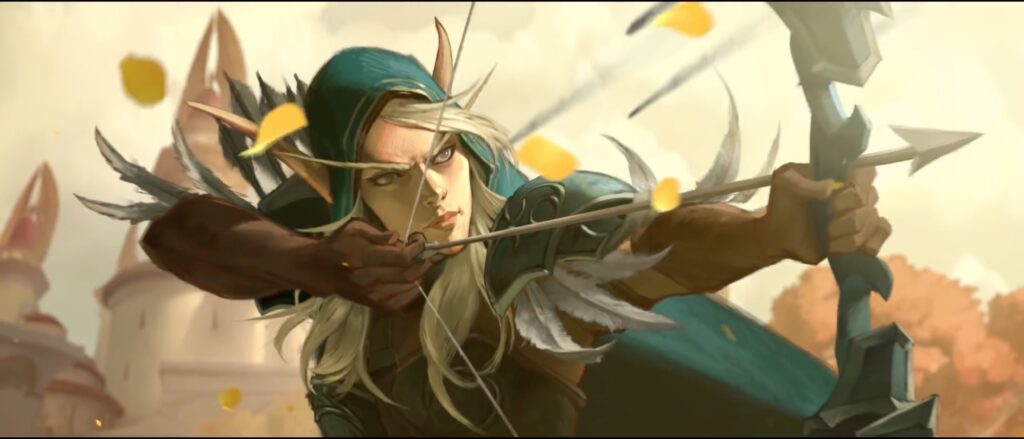
Ranger-General Sylvanas
Let’s start at the beginning of Sylvanas’s story, She was once the Ranger-General of the kingdom of Silvermoon, a kingdom inhabited by Elfs. Then a bunch of things happened that I don’t need to explain for this blog post but basically a big bad dude named the lich king needs to use the sunwell (the source of the kingdom’s magic) to revive one of his top generals. He and his undead army (the scourge) invade the kingdom and Slyvannas and her rangers are forced to defend an ultimately losing battle. you can see how this unfolded in the game Warcraft III and also in the cinematic ‘Warbringers: Sylvanas‘. She then serves under the lich king before breaking free with a group of undead now called the forsaken, to which she is the leader. Her sole mission is to make the Lich King pay for what he did to her, but ultimately she was too late. During the events of World of Warcraft:Wrath of the Lich King, The Player-Characters along with Tirion Fordragon (He really didn’t help) would defeat the lich king atop the frozen throne in Icecrown Citadel. It is important to mention now that there must always be a lich king, and that a new one by the name of Bolvar Fordragon, a former paladin, would take on the burden. Sylvanas was too late, and in a fit of rage realizing she failed, she tossed herself off the top of Icecrown to her death. She then would enter the shadowlands and bear witnesses to horrors. She ultimately is saved by a Val’kyr. Which are a species of Angel-like beings that are able to revive her at the cost of their lives. She makes a Deal with the master of death, The Jailer and it sent back to the realm of the living with 6 Val’kyr.
This is the last time we will mention Sylvanas until the expansion World of Warcraft:Legion. Before we get to that, let’s introduce her arch nemesis, Genn Greymane. Genn will also (probably) be getting his own Blog post for his stupidity and general incompetence. Basically Genn is the king of the Kingdom Gilneas, which was locked away after the fall of Lordaeron, which is the Kingdom that is responsible for the Lich king. In an abundance of safety, they built a giant wall to safeguard their kingdom, which worked until the events of World of Warcraft:Cataclysm. In which the Dragon Deathwing would cause the world to undergo mass change, which included the breaking of the great Gilnean wall. To summarize what happens in the worgen starting area, basically there’s a curse that if you get bitten by a wolf-like human being, you become one and that’s what happens to Genn and co (including the player-character). Then for some reason the forsaken invade the town for reasons I forget/were not important. Then the battle for Gilneas happens and Sylvanas (the leader of the forsaken) Kills Genn’s son. If you ask me, his son did it to himself, and Glenn really shouldn’t be that mad at Sylvanas.
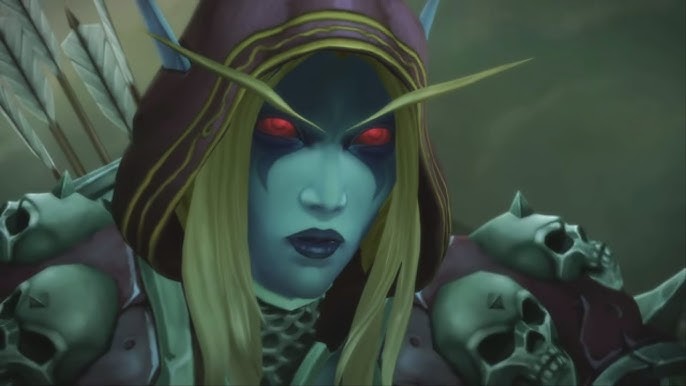
Sylvanas on the Broken shore
Now let’s return to legion. In the opening for legion, the battle for the broken shore, the horde and alliance team up to both collectively get their ass kicked by the legion. In the climax of this battle both the Leader of the Horde, the Warchief Vol’jin and the Leader of the alliance, King Varian, are killed. Well, technically Vol’jin would live for a little while longer but we will get to that. In the Climax of this Battle, the Warchief would fall in battle and Sylvanas would make the tough decision to withdraw the horde from the battle, leaving the alliance to be overrun. Genn immediately assumes Sylvanas betrayed them, which is yet another example of his stupidity. The Alliance is then forced to retreat when the warlock Gul’dan summons a giant Fel reaver and seemingly has the alliance on the ropes when King Varian decides to sacrifice himself for the Alliance, ultimately literally getting disenchanted by Gul’dan. Back on the horde side, Vol’jin is slowly dying and in his final act as warchief, he claims the troll spirits of death, the loa, told him that Sylvanas must be warchief. You can watch all this unfold ‘here‘.
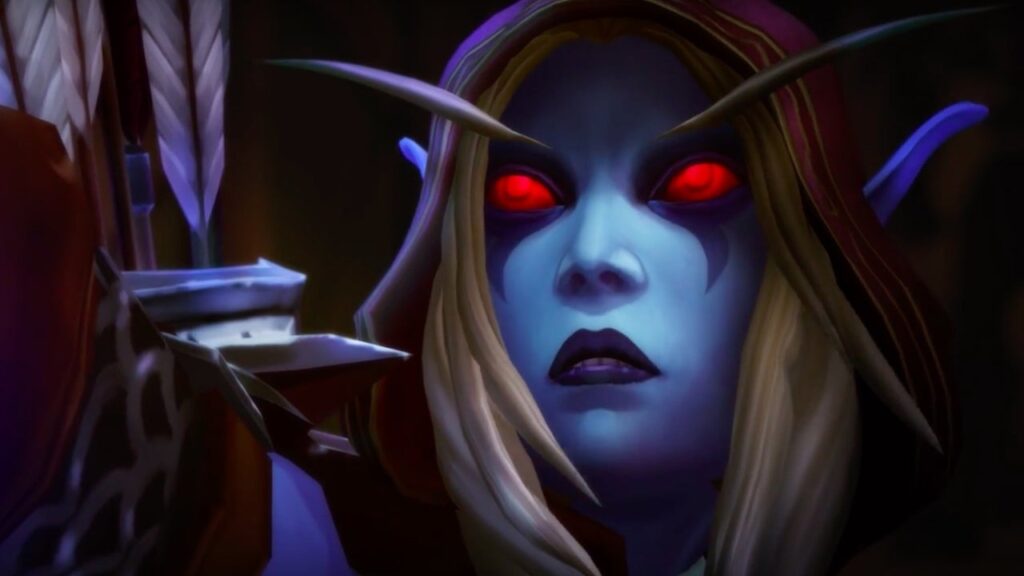
Sylvanas in Stormheim
The only Key point from Legion comes in the Finale to the Zone Stormheim, in which we Find Sylvanas and Genn once more, this time Sylvanas has made a deal with the Demigod Helya, who oversees the warrior version of hell, Helheim. She obtains a lantern and uses it to trap the Queen of the Val’kyr, likely in an attempt to obtain more for herself to prolong her life, as she has used a few over the years. Once again though, here comes Genn. I would explain what happens but honestly just watch it ‘here‘.
Before we continue we must acknowledge the first instance of bad writing, coming off the back of the Legion expansion, the two factions united to defeat the legion and are arguably closer than ever, so why is it that the next expansion is based on yet another faction war? This makes no sense as even if the Alliance is somehow bitter about the broken shore, Genn himself in the moment admitted without the Horde, They’d have been overrun and the reality of the situation doesn’t change, both the warchief and the King died that day, and if the horde had stood its ground, even more would’ve died for what?
This is the last we would see of her until the opening of World of Warcraft:battle for Azeroth. In the opening for this expansion, Sylvanas would Storm the Night Elf capital of Teldrassil, ultimately climaxing in her first act of pure evil. The capital of Teldrassil is where the majority of the Night Elf faction lived. Sylvanas would demand her 2nd in command, Nathanos, to burn the tree.
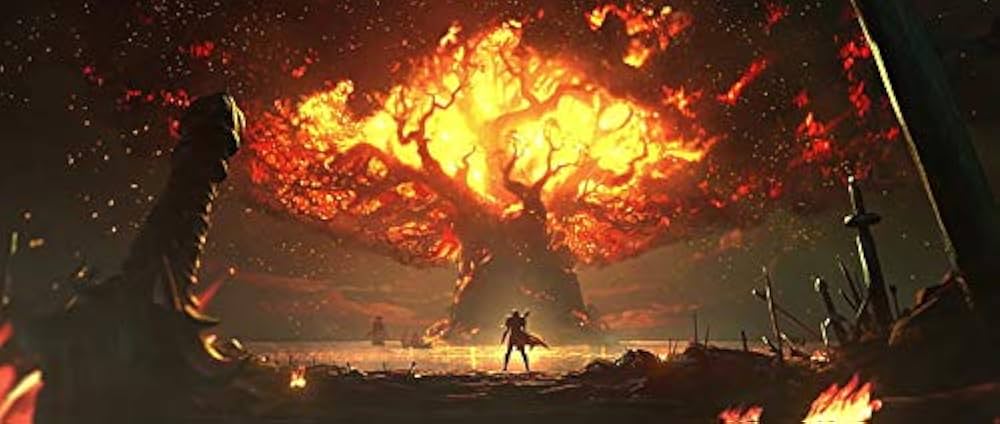
Slyvanas burning Teldrassil
This act would Kill millions of harmless civilians. if you haven’t yet, now i would recommend watching the Warbringers:Sylvanas video. This act was met by horror both canonically among the Horde and Alliance and also among the playerbase. I failed to mention earlier but the forsaken would make the fallen kingdom of Lordaeron their home, and this is where the Alliance would strike back in retaliation, this is where the Teaser trailer for BFA would take place, as for the Finale of this battle, watch it ‘here‘. In this battle, she would abandon a longtime member of the Horde, Varok Saurfang to stand his ground outside the throne room. I won’t cover the full story of BFA, but I will say the horde is built on the idea of Honor and this would ultimately Divide the Horde into two factions for the 2nd time in it’s history, I might cover the first one in a different blog post. This would Culminate in The Mak’gora between Sylvanas and Saurfang. In orcish culture a Mak’gora is a duel to the death, and considered an honorable way to settle disputes. This duel would take place on the very gates of Orgrimmar, the capital of the horde, watch this duel take place ‘here‘. This duel would mark the end of the 3rd war, afterward, Sylvanas would flee into hiding for a while, and would miss the reawakening of the Old God N’zoth.
Here is where I want to stop and explain my frustrations with the Slyvannas character before we go off the deep end, In her duel with Saurfang, she would blast him with a instant kill dark magic, that we the players had never seen before, and wouldn’t be explained until later, and even still, was not a good enough response. We would learn later that Sylvanas started the 3rd war because of her deal with death, and that the more souls that end up in the Shadowlands, she would gain more power accordingly. This wasn’t explained to us and still doesn’t excuse her war crimes nor the bad writing. In hindsight we had no idea how good we had it because now it’s time to jump off the deep end.
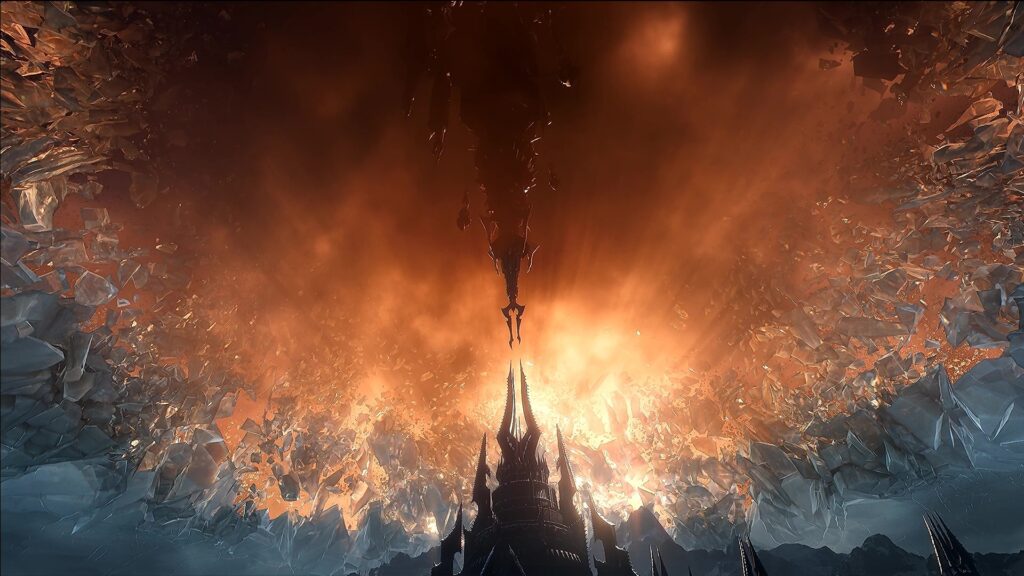
the Shadowlands
I mentioned the Shadowlands, this is the expansion that would come out during and was affected in development by the Pandemic. Watch the Teaser Trailer here, now we have arrived into the peak of the Mary Sue argument and where my rage begins. The Lich King is a character beloved my many WoW enthusiasts and a character whose return was foreshadowed all the way back at the end of Wrath of the lich king, which at this point, was 12 years ago. We were told there must always be a lich king, and Sylvanas just shows up and beats his ass using powers we had never seen before, breaks the helmet which keeps the scourge in check, then fucks off to the shadowlands.
my main issue with this is the poor job of storytelling they did, many people have said that the story could still work if Bolvar won the fight, I personally wish they had done more foreshadowing, perhaps instead of 8.3 being about N’zoth, maybe we should have chased after Sylvanas and defeated her in combat and in that we would see her new abilities and be able to relate to them and understand when she pulled the chains out of her Arrows, but instead we were left shocked and disappointed.
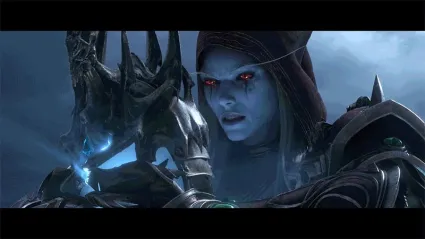
Slyvanas shattering the crown of the Damned
The story of the Shadowlands is messy, incomplete to this day and ultimately not what I’m here to yell about. I want to finish out Sylvanas’s story, I want to point out the key points in her story, the next time we would see her would he in the maw with Anduin, as the jailer broke the new king of the alliance into his tool. We aren’t here to cover that however, so we will move on to Tyrande for now.
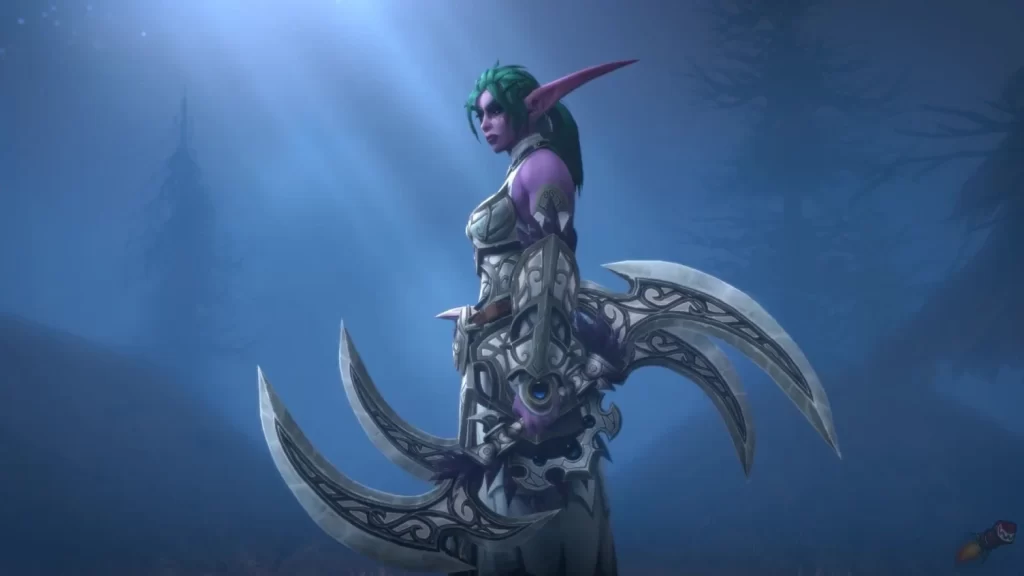
Night-Warrior Tyrande
Tyrande was the leader of the Night Elves when Sylvanas Burned their home, and has been plotting her vengeance on her for a long time. She would undergo a ritual transforming her into the Night-Warrior, the chosen of her Goddess Elune, who is worshipped by the Night Elves and the Druids alike. She gains immense power in the name of vengeance and one of the first acts she would do as Night-Warrior is Kill the man who ultimately ordered the Burning of Teldrassil, Nathanos. She would then cross the Veil of the Shadowlands and try to find Sylvanas in the Shadowlands. This interaction would finally Happen during the Battle of Ardenweld, which is the Zone Tyrande would find herself in and is closely related to Elune, thought how is still unclear (Thanks unfinished story). Watch the Cinematic ‘here‘, In this battle, Tyrande would finally get the chance to execute her Vengeance, She taunts that the Jailer didn’t tell Sylvanas that Nathanos had died. The battle Climaxes when the Forces of the Jailer break through the defenses of Ardenweald, and Sylvanas uses it to Get away, Tyrande then offers in her native tongue “My life for hers” and blasts off after her, which is a deal that Elune would reject for reasons unclear to this day. In the Lore, the power of the Night-warrior was enough to Kill an Old God, which is something that took The Player characters and The literal world soul being channeled through them to do. So how is it possible for Sylvanas to escape unscathed at all? This is bad writing, It is never explained why Elune rejected Tyrande’s offer. All this cinematic boils down to is Sylvanas Taunting Tyrande and then fucking off, once again. What makes even less sense is the Cinematic explanation Behind Elune. The Winter Queen is the Eternal One who watches over the Realm of Ardenweald and apparently her sister is Elune, who in another plot twist, allowed the burning of teldrassil to aid her Sister’s call for more Spirits in her realm, as all spirits had been condemned to the Maw since the events of Legion (the maw is hell). This again makes no sense, what kind of sadistic god would sacrifice her own people in the name of the afterlife, then deny their leader vengeance, this feels like having your cake and eating it too. But fine, Sylvanas runs off and we wouldn’t really see her again until the raid The Sanctum of Domination, in which she is the final Boss. The plot of patch 9.1 follows the Jailer collecting all the Sigils of the Eternal ones to restore his power, and in the climax of the Sanctum of domination, the Jailer and co invade the Eternal City, where the final sigil, the sigil of the arbiter resides, Sylvanas holds off the Player characters long enough for the Jailer to arrive and claim the final sigil, then in what I can only describe as some of the worst writing, i don’t even want to say it, just watch it ‘here‘.
To quote one of the top comments on the video “The Jailer (Who we don’t really know anything about, but don’t worry) got all the Sigils (What we don’t really know nothing about, but don’t worry) to open (We don’t really understand how, but don’t worry) the way to the Sepulcher of the First Ones (Which we don’t really know anything about, but don’t worry) to utilize some First Ones technology (Who we don’t know anything about, but don’t worry) to unmake reality (Which doesn’t really mean anything, but don’t worry).” This highlights how poorly shadowlands as a whole was written, but let’s return to Sylvanas. This redemption arc makes no sense, “I will never serve?” Hello, what? She has been serving the Jailer indirectly for almost a decade now, at least since the events following the death of the Lich king, if that is not serving, what is? This makes no sense, why turn now if she is feeling bad about anduin, who’s story arc i did not cover but it really shouldn’t matter, Anduin is literally the person she waged war with last expansion. If she had seconds doubts about serving, she could’ve found another way. This is not a tragic villain, this is a character who could’ve been so much more but was ruined by bad writing.
But fine, Let’s wrap this up with the end of her story (For now), She is Met in her soul by Uther and asked to make a decision, accept the legacy of the Banshee queen and refuse to help or Accept the consequences and Face the Jailer, she chooses to help the fight against the jailer.
After the Jailer’s defeat and the return of order to the shadowlands, she must face her punishment, she surrenders herself to the mercy of Tyrande, who says she must return every soul she damned to the Maw to the arbiter for proper assortment into the shadowlands. This may be the reason Elune didn’t grant her wish earlier but still doesn’t really make sense to me, surely someone else would have been assigned to do that if Sylvanas had been slain in Ardenweald.
This is the fate of Sylvanas though she and anduin would interact again . So why does this make me mad? There are genuine elements of a tragic story here, but they are conveyed so vaguely and ultimately culminate in a redemption arc that feels forced and hollow. Try telling someone who played WoW from wrath to the end of BFA that the Sylvanas they knew from OG WoW to now is a totally different character, to put it how my mom put it. “She used to be a cool badass and now they’ve made her into something she was never.” Do note that what she knows of The story of Sylvanas during BFA and Shadowlands came from me as she quit the game after legion. This story is a sad tale of yet another nice female character ruined by the agenda to make all women powerful, which is not to say they can’t or shouldn’t be, but when you have to use bad writing to make it happen (Rey in the New star wars trilogy) it leaves the audience shocked and angry, Blizzard had a strong character and a strong Antagonist they made her into, but her actions in the shadowlands made no sense, much like the rest of the Expansion, to the point where by the time of the release trailer for Shadowlands, after she defeated the Lich King, many players were checked out because she was too strong and it made no sense to them. This story is a reminder that you must show the audience not tell, and everything they did with Sylvanas post legion was tell and not show, so when she pulled out new death powers, it made no sense and they tried to explain afterward, but that’s not how stories work, you don’t get to tell a story and make it make sense after, that’s not writing, that’s bullshit.
In the year 2016, Beyonce released what I believe to be her best album, titled Lemonade. She would then Go on to perform the Song ‘Formation‘ at the super bowl halftime show, drawing immense hate from various sources.
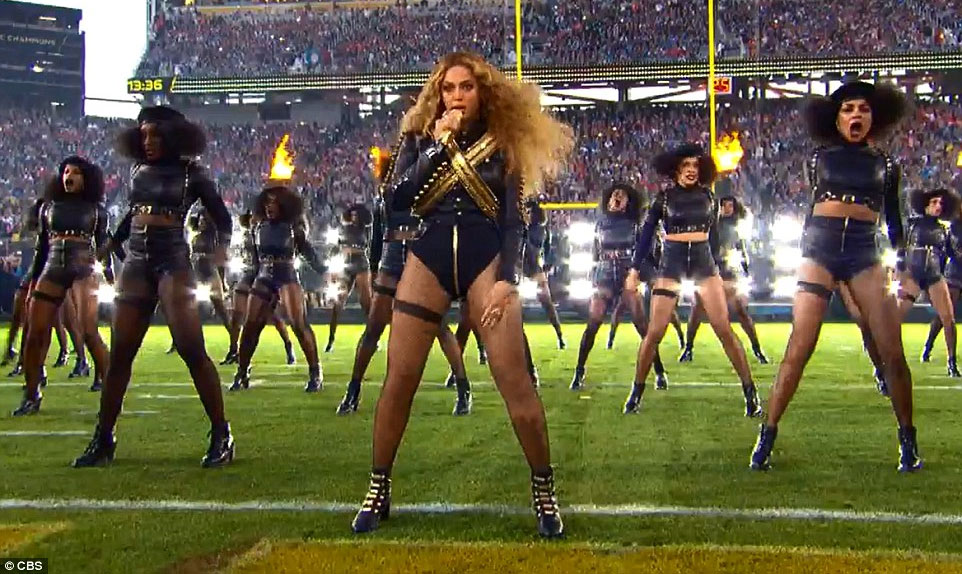
Beyonce in 2016
Fun fact about Lemonade, It is one of the three Vinyls I own, as for how much it cost, best not to discuss that.
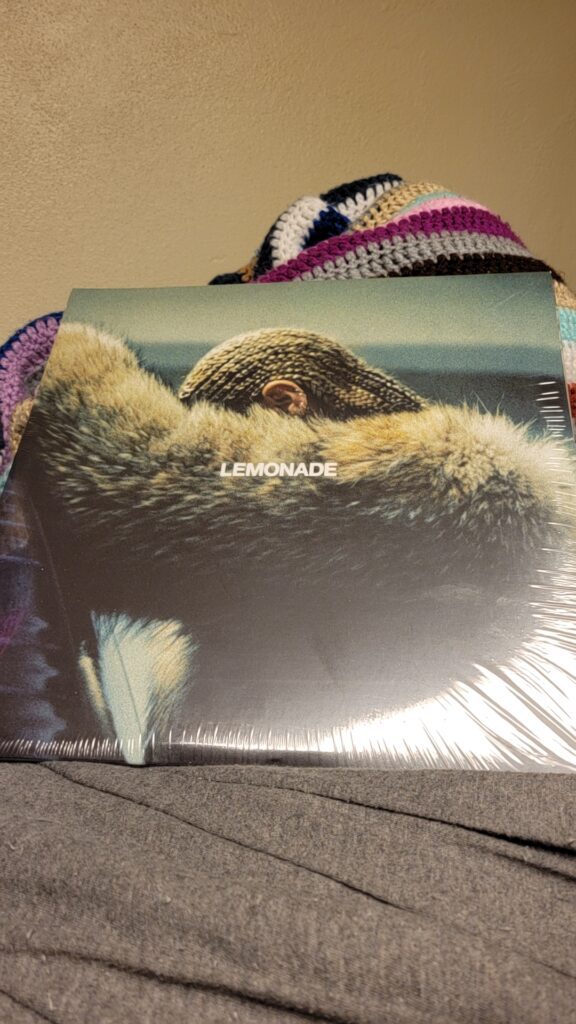
This album is widely agreed to be among her best and definitely worthy of a grammy, that it did not receive. Both the Song Formation and the album Lemonade were nominated for several grammys, and while Lemonade did receive the grammy for Best Urban Contemporary Album , It did not win Album of the year, that award went to Adele for ’25’. This is widely considered among pop culture enthusiasts to be the biggest snub of her career. Song of the year went to ‘7 years’ by Lukas Graham instead of Formation, and while I personally may object because I like Formation better, I can’t argue this is a snub. While Beyonce would finally win an album of the year for Cowboy Carter in 2024, I would argue It did not deserve it, though she did deserve to win an AOTY. I would argue that in 2024, there was no better album than that of ‘Brat’ By Charli XCX.
Let’s talk about the cultural impact of Lemonade, the pretense to this album is that Beyonce’s husband, Jay-Z, is alleged to and later, after lemonade, admitted to cheating on her, it is widely speculated that his mistress was Rihanna, but that was never confirmed. In many songs on the album she references her frustrations and pain she feels towards her husband, in songs such as ‘Hold up‘, she says “How did it come down to this? Scrolling through your call list, I don’t wanna lose my pride, but I’ma fuck me up a bitch.” and “Can’t you see there’s no other man above you? What a wicked way to treat the girl that loves you.” and finally, “Let’s imagine for a moment that you never made a name for yourself, or mastered wealth, they had you labeled as a king, Never made it out the cage, still out there movin’ in them streets, Never had the baddest woman in the game up in your sheets.” She clearly takes shots at Jay-Z here and this was while the cheating rumors are being spread amongst fans, but would not be confirmed by Jay-Z until the year after the release of lemonade, 2017.
The other Impact of Lemonade was that of the song Freedom. The Song Freedom was widely used by Kamala Harris during her campaign in 2024, but I would argue the song much deeper than that of wanting freedom or independence. it is her message of hope to anyone who is also struggling with infidelity. The core of the album explores her dealing with the discovery, grief, hope, and forgiveness of infidelity.
Formation also had a significant tie to the black lives matter movement and the protests going on in Louisiana at the time, and how they were allegedly affecting the black and black queer community disproportionally ,as well as a callback to Hurricane Katrina. The video caused mass stir with police around the country, many of them threatening to protest beyonce concerts i.e not secure them. It also caused some stir among the non-black communities and she faced immense pushback for this.
Lemonde was a very controversial album when it came out, many hated on her, many police said they would stop guarding her concerts and even accused her of glorifying violence, and to that she had one performance to shut them all up, which was what I opened this blog post with this, ‘Formation.‘ at Super Bowl L.
My name is Mark, I grew up about two and a half hours southwest of here, and I am a choral composer and have been for three years. I’m also a singer here in the University of Oklahoma’s Men’s Glee Club.
I would like to present two truths and one lie about myself. 1. I have seven half-siblings, 2. I often make important personal decisions on an impulse, and 3. I have had my ears pierced since I was 7 years old.
I haven’t yet decided what I am going to blog on, but I might choose something simple, like the methodology of how I make music, or what it looks like to make music behind the scenes. However, I find that these topics may not interest readers, so instead I am going to analyze movie villains with a psychology bent. If that’s not quite up to par, maybe I’ll delve deeper into the relationship between empathy and society. (Credit to Professor King for the revision)
